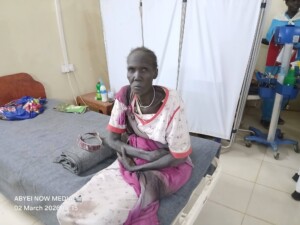UNITAMS talks: Sudan grassroots committees to prepare ‘political charter’
The UN Integrated Transition Assistance Mission in Sudan (UNITAMS) has started talks with various democratic groups and parties in the country. The Sudanese resistance committees active on grass roots level in all parts of the country will present their joint standpoint in a political charter that is currently being drafted.
 UNITAMS head Volker Perthes (who reportedly tested positive on COVID-19) digitally addresses members of resistance committees (Social media)
UNITAMS head Volker Perthes (who reportedly tested positive on COVID-19) digitally addresses members of resistance committees (Social media)
The UN Integrated Transition Assistance Mission in Sudan (UNITAMS) has started talks with various democratic groups and parties in the country. The Sudanese resistance committees active on grass roots level in all parts of the country will present their joint standpoint in a political charter that is currently being drafted.
During a meeting with representatives of the UNITAMS Political Bureau in Khartoum on Saturday, leading members of a number of resistance committees active in the neighbourhoods of greater Khartoum underscored their “adherence to a pure civilian rule and [the need for] the complete exclusion of the military from political practice”.
In a memorandum handed to UNITAMS during the meeting, the grass roots committees stated that they will definitely keep to the slogans of the uprising against the military, “No negotiations, no partnership, no bargaining [with the junta]”.
The transition period leading to elections “requires consensus among the components of the revolution and the forces rejecting the coup, in support of the political charter that has been drafted by a number of resistance committees in Khartoum, and which is now presented for consultation to their counterparts in the states”.
The committees further consider the Constitutional Document, agreed on by the then military junta and the Forces for Freedom and Change alliance in August 2019 as the basis for governance for the following three years, “an unworkable governing framework for the transitional period”.
Their priorities are “overthrowing the military council, undoing the consequence of the [October 25] coup, and holding the perpetrators of crimes [against protesters] accountable”.
‘International mechanism’
The Central Command Council of the Forces for Freedom and Change (FFC) has decided “to deal positively” with the initiative of UNITAMS to facilitate a Sudanese dialogue between the military and the various opposition forces in order to reach an agreement to end the current political crisis and agree on a sustainable path of progress towards democracy.
In its vision paper, handed to the representatives of UNITAMS on Sunday, the FFC said that “ending the military rule is the only way out”.
An “entirely civilian government based on a new constitutional charter” is to lead the country “to free, fair and internationally monitored elections at the end of the transitional period”. After handing power to a civilian government, the various military and paramilitary forces in the country are to merge “into one professional national army”.
'Ending the military rule is the only way out' – Forces for Freedom and Change
The FFC further called for expanding the initiative of UNITAMS by establishing “a high-level international mechanism in which regional and international parties will be represented, provided that the UN mission in Sudan would be the rapporteur of the mechanism”.
The FFC Council recommended consultations with the FFC, the forces that signed the Declaration of Freedom and Change in early January 2019 and later left the alliance, the resistance committees, and all rebel movements in the country, and called on UNITAMS to set a time limit for the political talks.
‘No early elections’
The Communist Party of Sudan (CPoS) also responded to the request of UNITAMS head Volker Perthes to present its vision on the current political stalemate.
In a press statement on Sunday, Saleh Mahmoud, member of the party’s Political Bureau and Secretary of the Foreign Relations Office, said the CPoS demands a full civilian government, and rejects any form of partnership with the military.
The party also rejects “any attempt to return to the situation prior to October 25, including the August 2019 Constitutional Document and the Juba Peace Agreement, signed by the Sudanese government and the Sudan Revolutionary Front rebel alliance in October 2020.
'Any attempt to return to the situation prior to October 25 will be rejected as well' – Communist Party of Sudan
The party called for “justice for all victims of the military and security forces, the cancellation of the State of Emergency, the lifting of the immunity for all security personnel and the various regular forces, the abolition of all laws inconsistent with international covenants and agreements related to rights and freedoms, in addition to restoring the independence of the judiciary”.
According to the Communist Party, the UNITAMS mission should acknowledge that “the current authority is a dictatorial military one, to affirm the right of the Sudanese to enjoy civilian rule and enjoy all rights and freedoms, and to advise not to hold early elections, especially in light of the presence of the military component in power”.
On January 11, Special Representative of the UN Secretary General for Sudan and head of UNITAMS, Volker Perthes, announced the start of talks on the political transition in Sudan, in order to reach an agreement to end the current political crisis following the military coup d’état of October 25, and agree on a sustainable path of progress towards democracy and peace. As previously reported by Radio Dabanga, the U-led initiative received mixed reactions from various political forces in Sudan.











 and then
and then